Well-organized stockpiles of food are our safety net during uncertain times. With an impending depression looming, it’s time to take a look at our canned food stock and adjust as necessary.
If you need to add to your canned food collection, eat what you have, then head out to the store to buy some more. There is no telling what tomorrow can bring.
To keep your canned food storage optimal, you know there are quite a few steps involved. It’s not as simple as buying out the clearance section of the canned food aisle and saving it for a rainy day. That’s not prepping, it’s just overbuying.
Here are some common mistakes you are making when buying canned foods for storage:
Disregarding Shelf Life
Expiration dates and best-buy dates are untrue when it comes to canned food, so what do you do?
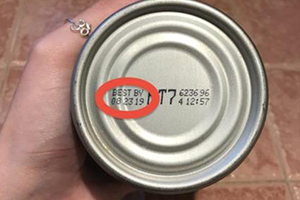 Use-by dates on canned foods are usually an arbitrary date set by the manufacturer and have little to do with the can’s shelf life.
Use-by dates on canned foods are usually an arbitrary date set by the manufacturer and have little to do with the can’s shelf life.
In an emergency, you can pop open an undamaged can of beans that expired 5 years ago to keep your family fed without harm.
The quality may be compromised, but the food is still safe to eat.
Related: How to Tell When Your Canned Foods Become Spoiled?
Shelf life has more to do with the freshness of taste and texture rather than spoilage in most cases. Canned foods sitting in water for too long, like corn or potatoes, can get mushy and lose consistency.
The canned food will be edible past the expiration date, but the flavor and texture may dissipate. Nutritional value also decreases.
Non-acidic foods have a fresh shelf life of up to 5 years before sacrificing quality. Acidic foods like canned tomatoes or mandarin oranges have about 18 months. The foods are still edible beyond that timeframe, but you may enjoy them less than usual.
Not Rotating Stocks
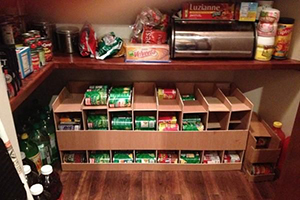 First in, first out, or FIFO is a tactic I use to rotate my stock.
First in, first out, or FIFO is a tactic I use to rotate my stock.
Older items go in the front of the shelf, newer items are stored behind them. The newer items have a longer shelf life, so they can sit longer than previously purchased cans.
There are even FIFO shelves for purchase to track your stock rotation, which I use to make stocking and storing that much easier. Why not take all the help you can get?
Always keep your stock rotating forward, otherwise, you are sitting on uneaten food that goes bad, which is not saving money in the long run.
The continued rotation will also keep your stock fresh and nutritious. Not adding on top of, but rather replacing food stock sets you up for a survival situation.
Not Having an Organized List
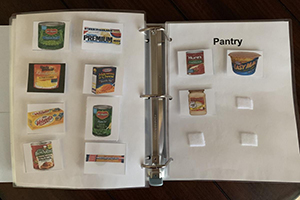 An organized, itemized list of all foods should be kept near your stock. This list should also include expiration dates for each food item.
An organized, itemized list of all foods should be kept near your stock. This list should also include expiration dates for each food item.
This helps you keep in mind what needs to be eaten and replaced before the food loses freshness.
You are not going to want to go through each can’s expiration date when you’re desperate just because you can’t bother to be organized.
Related: What Should You Do With Your Canned Foods After the Expiration Date?
Buying Big Cans Instead of Single Portions
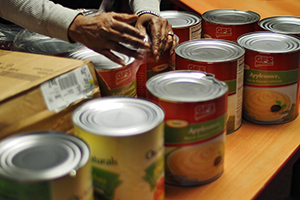 The biggest waste is buying a large can of something only to eat half of it before the food spoils. You may think large cans are more economical when grocery shopping, but that doesn’t mean they are better. You have to be sure you will eat that whole can in one sitting before opening it up, no matter the size.
The biggest waste is buying a large can of something only to eat half of it before the food spoils. You may think large cans are more economical when grocery shopping, but that doesn’t mean they are better. You have to be sure you will eat that whole can in one sitting before opening it up, no matter the size.
Make sure that each family member has their own 14-16 oz. can of their preferred fruit, vegetable, or prepared food. Any larger may go to waste, and wasting food in a time of survival is not okay.
Keeping Dented or Rusty Cans
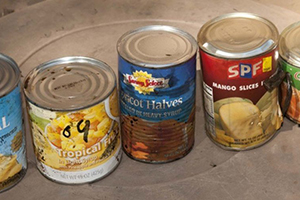 Canned foods typically do not spoil on their own. Usually, there is an outside force that has to do with spoiling. The can itself has either corroded or cracked. If you drop a can, a dent or crack can form on the can’s surface. This is the perfect pathway for bacteria to get into the food and breed.
Canned foods typically do not spoil on their own. Usually, there is an outside force that has to do with spoiling. The can itself has either corroded or cracked. If you drop a can, a dent or crack can form on the can’s surface. This is the perfect pathway for bacteria to get into the food and breed.
Do not keep rusty cans, either. Rust means moisture, and moisture is like a welcome mat for diseases and bacteria.
All food storage cans should be dent-free, rust-free, and moisture-free. You can’t always tell by taste or smell if bacteria has made its way into the can, but rust or dents are a sign of potential harm inside the can.
Related: How to Make a Natural Remedy for Food Poisoning
Storing Food You Don’t Like
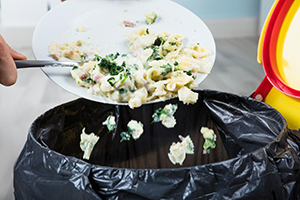 Sure, you might inherit some canned goods from grandma moving or a generous neighbor donation. However, only keep foods that you like to eat in your stock.
Sure, you might inherit some canned goods from grandma moving or a generous neighbor donation. However, only keep foods that you like to eat in your stock.
If you don’t want to eat it now, you will not want to eat it later.
In a dire situation, you will not be happy with 50 cans of lima beans if you hate lime beans.
Storing food you don’t like also takes up precious space on your shelves. It seems like I shouldn’t have to tell you to not stock non preferable food, but you’d be surprised.
If you won’t eat it, donate it to a food pantry instead and share the wealth.
Storing Food You Don’t Know How to Prepare
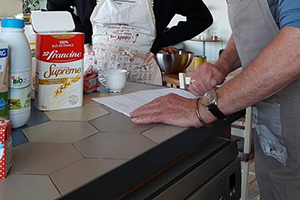 Again, you may have an inheritance of canned food, not knowing exactly how to prepare all of it. If desperate times come and all you have in your stock is food with confusing preparations, your family could go hungry. All food is not always good food, so be picky about what you keep.
Again, you may have an inheritance of canned food, not knowing exactly how to prepare all of it. If desperate times come and all you have in your stock is food with confusing preparations, your family could go hungry. All food is not always good food, so be picky about what you keep.
Do not take up precious storage space with foods like MREs if you do not know how to prepare them.
The same goes for any preserved raw food that requires some type of cooking for safe eating. If you are unsure of preparation details, do not keep that item in your stock. It will be more trouble than it’s worth.
Cleanliness and organization are the two most useful tools to avoid mistakes when buying canned foods.
Once you master that, use the FIFO method for first in, first out when rotating your food storage.
This way, nothing goes to waste and your stock stays full. Be sure to only stock foods that you and your family enjoy.
My motto is waste not, want not, so be smart about the impending depression and what it means for your canned food supply.
You may also like:
5 Ingenious Ways To Refrigerate Your Food Without Electricity (Video)
Cheap Foods That You Can Buy At A Mormon Cannery
The Bug-Out Vehicle That Can Literally Take You Anywhere You Want

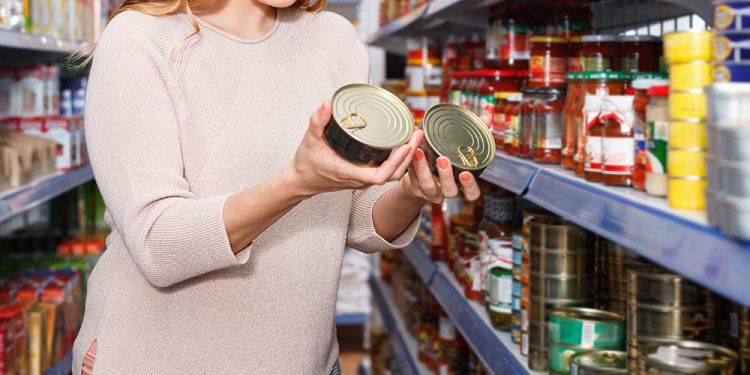
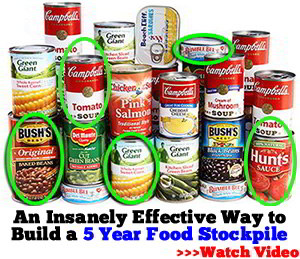













Is there any difference in can safety, storing cans on their sides vs upright? thank you
Tins stored on their sides and moved to the front everytime you add to the back will move Tin and help prevent any issue. I have often opened a can of beans used directly from supermarket.shelf with an inch of dried beans caked at top of Tin when I opened it and have had no issues from consuming the contents, I just mix the whole contents together and they are fine. The canning process removes any bacterial that may cause health issues. Only compromised when the tin is damaged such as dents or rust or moisture which indicates tin has pin prick somewhere. These tins will cause health issues. Also wrongly lined or unlined tins will leach chemicals into the contents so test what is stored and buy only good quality properly lined tins It will taste tinny if not good and cause health issues. buy a different brand.
In an age of digital information at a fingertip, it’s important to remember to print several recipes for shtf. A simple binder with basic bread, biscuits, easy cheese making, cookies or anything else you would like is one of my favorite items. I know I probably won’t be cooking complex dishes, but having a printout of the most needed day to day recipes can make your life easier. Especially for the next generation.
I have wonderful older cookbooks, including one that has recipes from the settlers from each country. Making German foods or Spanish from easy to source ingredients has been enjoyable. But the books are big and heavy. If we get to shelter in place that’s great, but I don’t want to carry them if we are on the move. That little binder with most used recipes will definitely come in handy.
grab a couple of cookbooks from a thrift store and put them on a shelf. Old Betty Crocker is my favorite. I don’t really use them much as I cook more by inspiration than recipe but they could be a huge help for folks that don’t cook
if for information or just entertainment, find some books that are 100+ years old, a lot of old time info on food prep, storage, and cooking that was done long before the 1st piggly-wiggly opened up…..
For the most part this article makes good sense, but this just made me laugh: “Do not take up precious storage space with foods like MREs if you do not know how to prepare them.” Meals Ready to Eat= what’s to prepare they are ready to eat.
I almost agree with your statement on MRE’s, but we live in a world where people cannot operate can openers, have to be warned that peanut butter may contain peanuts, and coffee may be hot. If someone doesn’t have the knowledge or instructions on how to tear open a bag, they are screwed if all they have are MRE’s
Best response of the entire article…
We have a generation of morons eating tide pods. So…… It makes sense that they may not know what am MRE is or how it works. Maybe they saw a fancy ad and bought a bunch thinking they were an easy way to store food. There is a process that has to be followed to heat it up.
Being a former Marine, we had the privilege of eating MRE’s without the addition of water. After a while you become constipated, (water has to come from somewhere), so when the water buffalo showed up you drank like a fool. I served at the time the very first MRE’s came out, (gen one). They were all dehydrated and came in a very heavy, maroon colored, plastic pouch. You had to use your canteen cup and a trioxane tab for heat to boil the water to put in the entre. Good times. Semper Fi my prepper friends.
Canned foods can taste terrible from chemicals leaching into the contents from the metal tins. Different Tin linings available today prevent this and cost of product when Tin lined will be a little dearer than the cheapest on the shelf. Try the product out before storing long term. If it tastes tinny it will not be a good choice so choose a different brand.
And never share you SHTF preparedness info with a Democrat!! (a bot of humor there). Also remember that “lazy assed relative” will still be a lazy ass … and they will eat everything from soup to hay if they know you have it!
barter your food for their help: measure for measure so of mutual aid.
. No one us obligated to give ones life sustaining food to someone who refuses to participate in charity.
(I do not refer to the totally infirm…: their sincere prayers alone are of very great assistance)
George, love the humor, although I know several liberals that are phenomenal preppers! We don’t talk certain things but…will have each others back at any time! The “lazy assed relative” will not be fed unless they come with some type of skill that can be utilized by all of us. What I struggle with is the poor woman with a starving child that comes down the street or to my door! Yes I know some of these situations will be faked but somehow we figure out the real from the thief! So I add a little extra to my stash for that reason.
Stay safe and God Bless…
God bless you and your family for thinking about others!!
I am not as organized as the article suggests one should be, but I do follow FIFO, which helps to ensure I don’t leave things languishing.
Even so,vthere are times where I have bought items we haven’t gotten around to using for a number of reasons. Some are thinking it would be nice for a change, getting two when I needed one for a recipe we ended up not liking, changes in diet, and some simply purchased on spec.
Any of those items I tend to corral and put them on a shelf I have dubbed the Use Me Now shelf. My task is to work those into our menus in some way over the next month or so. Doing this has resulted in less waste, and I’ve also noted what the items were to avoid this happening again.
I have the shelf located in the first place I would go to get an item so it’s right in front of me to use up.
Other articles on this site have mentioned having several caches of food so that you can surrender one to the hordes when they come looking for your food. Don’t throw your expired food away, rather put them in one of your Expendable caches.
I disagree with only storing food you like to eat. If you come across tuna for free and some of the family don’t like tuna… when they get hungry enough they will be eating f*^#king tuna. Same as squirrel and other stuff they don’t want to eat today. 😉
I store evaporated milk in case shtf. I can use it in recipes since I don’t have a cow on my porch. Before expired I will use for coffee or donate and get more. I also store canned chicken for pretty much the same reason.
Usually, I buy on sale in quarries and sizes that fit the needs of my family, but I have been wondering since salt is a preservative, does It make a difference in shelf life if you store low or no sodium canned foods?
I prefer condensed milk to evaporated, Diana. The only difference being that condensed milk can be thought of as evaporated milk with a little sugar added. I’m not keen on canned chicken. Can’t even stand the smell of canned corned beef. Or the texture. I have canned fish and canned road kill (spam clone) on hand for my emergency protein. And the price keeps slowly edging up. We’ll see what happens before Christmas when the panic buying starts.
My problem with food storage is that we only eat fresh food so the only way I can rotate canned goods is to donate items to the foodbank as their expiration approaches. This results in me never having as much stock as a person should. This never bothered me until the Covid Panic emptied the stores and messed up supply and production chains. As Armin pointed out in his excellent posts yesterday the world wide supply chain is still screwed up and threatening to get worse. So I’m starting to feel, for the 1st time, that a significant downturn in the world economy could leave the shelves empty, and I need to do a better job of keeping up with long term food storage. Ugh, I hate the idea of living off canned food, varmints, and roots. Wonder if I’ll ever be hungry enough to eat Rhinoceros Beetle grubs? Makes Hormel Chili sound good.
Judge Holden:
If you don’t like canned goods, freeze dried food might be a good alternative for you.
But whatever lts you decide to go with, if you never eat from it now, you really need to start, at least for one meal once a week. This helps you quickly determine what you absolutely cannot choke down under any circumstances, and it will help you rotate the items that you can tolerate.
Canned food has gotten a lot better in quality than it used to be, and there are now low sodium and salt free foods that taste nearly as good as fresh. But you have to experiment and start ASAP before inflation really makes it impossible to stock up on items that you need.
I love Hormel Chile. Especially with a slice of cheese on top. Just wish I could buy it without the pop top lids. I don’t trust the seal for long term.
Spike, same here. That chili goes well with corn chips 🙂 And, the pop tops make me nervous, too. niio
I agree with doubting the integrity of the pop top lids, Spike. For longer term storage, I much prefer the kind that needs a can opener.
Judge Holden, would dried beans be something that would be more palatable if you can’t get fresh foods? I know I personally prefer most veggies frozen if I can’t have them fresh, but will eat canned if that’s all there is. If I can my own, I can at least control the amount of salt or start with the freshest possible priduct when putting them up.
I’ve also dehydrated some and have used them in soups, stews, and occasionally side dishes with good results.
When the garden us plentiful, I do my best to enjoy all I can fresh and preserve the excess for times where I can’t get fresh
There was a time canned chili was filet mignon to me. Back when I didn’t have a pot to cook peas in, and when you opened a can of chili it had a delicious cap of lard on it. Lard makes everything better. The pop top lids seem to come and go with no reason, I don’t like ’em either.
I do not buy the #10 cans because stores will up the price/ounce a penny or two over small cans. WalMart is good for that. If we can get the can cheatp, even with dings, we get them, but freeze the contents or dry it. niio
I don’t buy regular #10 canned vegetables but I have purchased Auguson Farms #10 cans of freeze dried meats and veggies from Walmart, home delivered. Much better prices that from other sources. And they aren’t as temperature sensitive by being freeze dried product. I’ve stored them away from the home along with cans of coffee, Mexican #10 cans of dried milk and creamer. Gallon glass jars of sugar also go out there.
If things don’t somehow improve a great deal store shelves will be pointless to look at..
I have bought #10 cans of fruit and tomato products then re-canned into jars of the size I would use. Takes time, but less waste when go to use/eat. Not veggies though, re-canning those is just too mushy.
I am so thankful for the knowledge here. Everyone has great info and so helpful. Did a “prep weekend” and found the grand kids depleted the batteries on lights and walkie talkies. Daughter in law organized our supplies from new to “may want to give away”. Wife likes fresh stuff so rotating stock is my job.
Did a great food update for my dog and cat thanks to advice from you all. Rabbits and ground squirels in peril!. Thank you to all of you for your insight. Been prepping for a long time yet the minds of all of you cause “pondering” which is a very good thing these days.
Write purchase date and contents on top of can with a good indelible marker pen. Saves the guess work if for some reason the label disappears.
Peter:
I do that too, mainly because it’s a lot easier to see than the itty bitty lettering they stamp on the cans, and a lot of times it’s on the bottom. I also used to mark the top of the can with an abbreviation for the contents to make it easier to see in the container I am using…b bns for baked beans, for example.
Oh yes, unless you have a young’un around with 20/20 eyes you have to write dates in big letters.
I actually like canned food, eating fresh was a health choice from years ago. What is hard for me to eat is restaurant food, they know Americans are addicted to sugar and salt and that’s about all I can taste. God gave us fresh herbs and peppers, what more could one ask?
I grew up on a cattle ranch that was miles outside of a town, we couldn’t just run into town to buy something whenever we wanted, so I grew up stocking and rotating food stores. I now live about two blocks from a grocery store, but we always have food and we do the FIFO. We keep several flats of dried and/or canned veggies, soup, fruits and meats and rotate them monthly.. It always amazes me how many people are at the store every evening around 5 and usually they are the same people. I can’t imagine not having at least enough food at your house that you don’t have to go to the store everyday.
I never thought of keeping a list by my food shelves of what we have. I may need to start doing that, sometimes I am in the store thinking “Was it peas or beans we needed?” I like the ideas I get from here!
My parents were Depression-era children. They stockpiled canned goods when I was growing up, so I’m in the habit already of having a fairly well organized pantry. My neighbors are also preppers. We were discussing separating canned goods so that if a horde broke it, they couldn’t strip us clean. We think if that were to happen, we’d already be in such dire straits it wouldn’t make much difference. Plus several of us are getting up there in age, and the work in rotating multiple food stocks is daunting. However, I’d be open to arguments. The way the Delta variant is sweeping the country, I think empty shelves are in the future.
Another question: how do you store canned goods in anunheated bug-out location so they don’t freeze? I have grains and dried foods, but is there a way to keep canned goods in that environment?
Try insulated boxes in as deep of cellar as is practical. Test with a few items to check your results.
Thanks for responding! No basement. Think a shed would do? I hesitate to store cans inside the house in case they explode. More concerned about attracting vermin than the mess it will cause. (Well, the mess, too.)
Our local walmart bakery sell empty clean frosting buckets with lids for $1.00 each 5 and 2 gallon plastic food grade buckets. You have to ask for them and pray someone hasn’t gotten them yet. I use them for as many things I can. Easy to write what is in them and wd40 or alcohol will clean off your list. One of my sisters lives in an apartment building for elderly people. They have a free table in their dinning area. Every time she sees the packets of 1 cup or 1 quart instant milk or the powdered egg packets she grabs them for me. Keeping things in the buckets not only keeps them secure but also stores them in a dark area. Hopefully you will be able to glean these buckets and not have to pay 5 plus dollars for a food grade bucket with a lid that seals
Dustier58 I dont know your situation, maybe high groundwater table, but I will advise a cellar is best. Sheds. outbuildings, attics are just too hard on can goods. Cool, stable temperatures and dark will give the best results for food storage. You may just have to take food with you when you bug out. Your ahead of me if you have a bug out location picked out, my plan is to stay in place for almost all situations. If fire, hazmat spill. or something like that forced me out I would just throw stuff in the fwd pickup and head out. One tank of gas plus 10 gal would get me somewhere beter than a FEMA camp.
I have a park model in a seasonal campground as a bug-out location, which is why it has no basement. I’m 2/10’s of a mile from a lake, so likely there is a high water table. Thanks for your advice. Looks as though I will need to stick with keeping freeze dried foods, dry goods and grains there, and haul my canned goods with me when I bug out. Though I seriously hope and pray I never need to bug out.
Don’t throw away food you don’t love or are unfamiliar with the preparation of. First it can be used to TRADE(aka barter) for something your do need. Second learn how to use it. Third if you are really hungry it is still better than FEMA camp food or starvation. That said for the love of God, puppies or whatever don’t buy more of it. Spend money on the stuff you like or at least will tolerate but don’t throw out for no reason.
Also by definition MRE are ready to eat right out of the package. Like IMP’s they are not gourmet and are kinda horrible to eat for more than a few days, they are not intended for long term consumption without fresh food. They are much better warmed.
I write DOP (date of purchase) on top of the can.
You may think this seems unnecessary, petty, unkind, whatever you may intuit from my suggestion, but think about it. “Who, what relative or friend will you be sharing your stockpile with, if you are kindhearted enough to do that. Of course everyone will agree to certain conditions, i.e. “when SHTF I will contribute/include equal amounts of cans/contents/quality as others in our pantry and will consume the same as the specified amount as others.” I bring this up because I had a longtime friend that I eventually parted ways with because of his lack of fair play. The person was simply either a greedy pig or an unconscious glutton. Example: Six people sit-down for breakfast and the first item placed on the table would be a platter of twelve homemade biscuits. Before the eggs and bacon had arrived, he would be on his fourth or sixth biscuit and jam and would do so rapidly and in an oblivious manner that was totally unconcerned with sharing but instead displayed the attitude of, “The man who dies with the most food in his gut wins.” Visit him on his home ground, suggest going out for dinner and he would try to steer you to the priciest restaurant, feign ignorance that another option might be available and would never consider offering to split the tab or cover the tip out of politeness. In fact, and this happened, he might be served a steak, would make the waitstaff standby as he cut into his meat and took a bite and then refuse the portion as being too tuff, not tasty, not juicy, not whatever and ask that it be replaced (That incident ended our friendship.). I could write a book but will stop by simply saying that you do not want to discover later that you have invited your own destruction into your “survival commune,” in the form of someone you may otherwise like but in your head and heart know is unconcerned about the welfare of others.